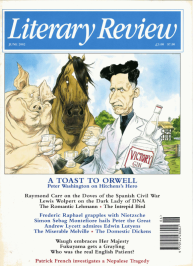Richard Gray
The Impulse to Believe
Herman Melville: A Biography Volume 2, 1851–1891
By Hershel Parker
The Johns Hopkins University Press 997pp £31
‘He can neither believe, nor be comfortable in his unbelief,’ Nathaniel Hawthorne once observed of his friend, neighbour and fellow novelist, Herman Melville, ‘and he is too honest and courageous not to try to do one or the other.’ For Melville, human experience was ruled by contraries. ‘There is no quality in this world that is not what it is merely by contraries,’ the narrator declares in Moby-Dick. ‘Nothing exists by itself.’ And those contraries were no more evident, he felt, than within each human being, as they struggled to find a basis for truth or faith, something that would really make life worth living. Melville could not resign himself to doubt, or to a placid acceptance of the surfaces of experience. ‘I am intent upon the essence of things,’ he has one of his characters announce in his third novel, Mardi, ‘the mystery that lies beyond … that which is beneath the seeming.’ That speaks for Melville’s own artistic project. What also speaks for that project, however, is an intimation offered by the narrator of Melville’s 1852 novel, Pierre. ‘Far as any geologist has yet gone down in the world,’ he tells the reader,
it is found to consist of nothing but surface stratified on surface. To its axis, the world being nothing but extended superficies. By vast pains we mine into the pyramid; by horrible gropings we come to the central room; with joy we espy the sarcophagus; but we lift the lid – and no body is there! – appallingly vacant as vast is the soul of man!
Hershel Parker begins the second volume of his magisterial biography with Melville eagerly awaiting the reviews of what he considered his best work to date, Moby-Dick. He had reason to think the book would cause a sensation and allow him to pay off the vast sums he owed to friends

Sign Up to our newsletter
Receive free articles, highlights from the archive, news, details of prizes, and much more.@Lit_Review
Follow Literary Review on Twitter
Twitter Feed
It wasn’t until 1825 that Pepys’s diary became available for the first time. How it was eventually decrypted and published is a story of subterfuge and duplicity.
Kate Loveman tells the tale.
Kate Loveman - Publishing Pepys
Kate Loveman: Publishing Pepys
literaryreview.co.uk
Arthur Christopher Benson was a pillar of the Edwardian establishment. He was supremely well connected. As his newly published diaries reveal, he was also riotously indiscreet.
Piers Brendon compares Benson’s journals to others from the 20th century.
Piers Brendon - Land of Dopes & Tories
Piers Brendon: Land of Dopes & Tories - The Benson Diaries: Selections from the Diary of Arthur Christopher Benson by Eamon Duffy & Ronald Hyam (edd)
literaryreview.co.uk
Of the siblings Gwen and Augustus John, it is Augustus who has commanded most attention from collectors and connoisseurs.
Was he really the finer artist, asks Tanya Harrod, or is it time Gwen emerged from her brother’s shadow?
Tanya Harrod - Cut from the Same Canvas
Tanya Harrod: Cut from the Same Canvas - Artists, Siblings, Visionaries: The Lives and Loves of Gwen and Augustus John by Judith Mackrell
literaryreview.co.uk